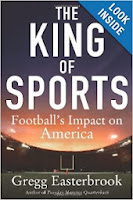Gregg Easterbrook is the man behind the weekly Tuesday Morning Quarterback column on ESPN.com. He is an accomplished author. His brother, Frank Easterbrook, is a federal appellate judge. He can get a little bit full of himself at times and sometimes his politics rub me the wrong way.
But, while I don't agree with everything he writes in his TMQ column, and while I don't agree with everything he's written, I do find him to be an enjoyable read. Especially his latest book - The King of Sports: Football's Impact on America.
There is plenty wrong in football today. The NFL has done its best to hide the fact that repeated blows to the head can be hazardous later in life. The NFL has done its best to keep the public from learning about the lingering aftereffects of concussions. The NFL has done its best to shield us from the ugly reality that the league chews up and spits out young players day after day after day.
But colleges, and the NCAA, are equally complicit in the illusion we are presented daily about football. Too many colleges act as minor league affiliates of the NFL. Few coaches and administrators are concerned with graduation rates of athletes. The reality is that very few college football players will ever play on Sundays. And, of the ones who do, the average professional career is but four years.
Colleges and the NCAA have built a business model in which millions upon millions of dollars are exchanged between media companies, sponsors and schools while the players give their labor away for (almost) free. Now I'm not about to make the argument that players should be paid to play. Such a system would lead to more and more consolidation of the top teams and would leave a permanent underclass that has no chance of ever catching up. The players are rewarded with a scholarship that will permit them to earn a degree that they can use later in life. Mr. Easterbrook suggests that football scholarships should be for six years which would allow players an extra year after their playing career is over to earn their degrees.
He also suggests that players be paid a small stipend - much along the line as what students who participate in work-study programs or who work for the school get. The only way to be fair is to make it a fairly low number that every football players earns.
Allowing the free market to determine the price at which a player sells his ability to play football would never work because the vast majority of universities have athletic departments that lose money. In other words, at most campuses, regular students subsidize the football team (and other sports teams).
And it's not only college football. We all subsidize professional football. It's our tax money that's used to build playpens for the super-wealthy so that the owners of these teams can make even more money. Teams blackmail municipalities for more and more goodies - local politicians give in because they are scared of losing votes should the local squad pick up and move elsewhere.
Here in Houston the county government gave in to Bud Adams' demands that the Astrodome be renovated. Mr. Adams threatened to move the Houston Oilers someplace else if the county didn't spend taxpayer money to put in more seats and spruce up the luxury seating in the Dome. But, long before the bonds had been paid off (they still haven't been), Mr. Adams up and moved the Oilers to Nashville, leaving the residents of Harris County to foot the bill. Things reached the point of absurdity when it became more costly to tear down the Dome than just to let it rot from the inside. Just this week taxpayers rejected a request for millions more in bonds to turn the Dome into a convention center.
Much of what Mr. Easterbook writes about in regard to safety on the gridiron has to do with the "trickle down effect" the NFL has on college, high school, middle school and peewee football. When the NFL projects an attitude that safety isn't important - that message finds its way down to the lowest levels of football. With the amount of money that flows into the NFL there is no excuse for the league to shortchange player safety.
But, lest you think everything about football is rotten, Mr. Easterbrook gives us an in depth look at the Virginia Tech program and its long-time coach, Frank Beamer. Virginia Tech seems to get it. Coach Beamer understands the importance of education and emphasizes it in the way he runs the team. No, Virginia Tech isn't sitting at the top of the polls and they haven't contended for a national championship in years, but their players graduate and they reflect very well on the university. For Frank Beamer, there are things more important than winning football games. After all, football is just a game - it's what comes afterward that's more important.

No comments:
Post a Comment